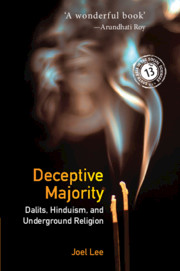2 - The Ummat of Lal Beg: Dalit Religion Before Enumerative Politics
Published online by Cambridge University Press: 15 February 2021
Summary
Who Are Hindus?
I am sitting with Gollu, his mother Kanti, and their neighbor Shankar in Kanti's two-room home in a bastī along the railway tracks in the town of Mirzapur in southeast UP. Gollu, his legs shriveled by polio, assists his mother in splitting the dried fronds of a coconut palm with a small knife; the split fronds will later be bundled and fastened together with a metal ring to become the bristles of a laggā jhāṛū, a long-handled broom, which Kanti will use in her work as a municipal sweeper. I am entertaining Gollu's seven-month old baby, who has just peed on my lap, while Kanti, working away with the knife, tells me how she officiates at goat sacrifices to their family's goddess, a goddess whose name I have never heard before. After some discussion of goddesses, I ask whether there are Sufi pirs that her family visits as well. Their neighbor Shankar, a fourth-class employee in the municipal water department, says, “We were Hindu from the very beginning [Ham shuru se hī Hindu the].” He goes on to explain that when the Delhi Sultan Alauddin Khalji forced rebels to convert to Islam, those who continued to resist were made into sanitation workers. He refers me to a magazine in which he recently read about this.
A few minutes later, since this is my first day in Mirzapur, Shankar takes me on a tour of the bastī. As we turn a corner, he gestures at a house on the left and says, “That house belongs to a Hindu. All the others here belong to our caste [Yeh ghar hindu birādarī kā hai, baqī sab hamārī birādarī ke hain].” Have I misheard? No, it seems not: in another lane Shankar again points to some houses that belong to “Hindu people” as distinguished from “our homes” on the other side of the street. I do not press the issue, but make a note of it in my notebook.
It is Diwali in Lucknow. My friends Sunaina and Jagdish and I are watching our young sons huddled together in a gully setting off all manner of firecrackers while the boom and crack of larger explosions resound in every direction.
- Type
- Chapter
- Information
- Deceptive MajorityDalits, Hinduism, and Underground Religion, pp. 31 - 74Publisher: Cambridge University PressPrint publication year: 2021



